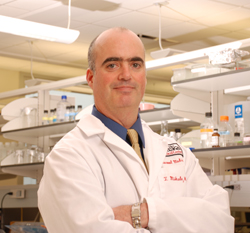 |
Ted Mikuls, M.D., an associate professor of rheumatology at UNMC, will be presented with the Gilmore Award on Friday, March 21 at 3 p.m. in the Durham Research Center Auditorium. |
Dr. Mikuls’ productivity since joining UNMC’s faculty in 2003 has earned him the praise of his colleagues both on and off campus.
For his research efforts, Dr. Mikuls will be presented the 2008 Joseph P. Gilmore Outstanding Investigator Award during a March 21 ceremony at 3 p.m. in the Durham Research Center Auditorium.
“He is recognized as a rising star in academic rheumatology,” said Deb Romberger, M.D., professor and vice chairwoman of research in the UNMC Department of Internal Medicine and Dr. Mikuls’ nominator. “Not only is he excelling in his research program, but he is also recognized as a top teacher and is highly regarded for his clinical skills.”
His list of accolades is impressive.
Since arriving at UNMC, he has secured two grants from the National Institutes of Health — a K23 grant to explore bone health in minority patients and veterans with rheumatoid arthritis, and a R03 grant to evaluate gene-environment interactions in rheumatoid arthritis autoimmunity and disease severity. He also has funding through the Arthritis Foundation on national and state levels.
Since 2003, he has been the first author of 21 publications, written multiple review articles and contributed to four book chapters. He also has been asked to peer review for several journals including the New England Journal of Medicine.
|
Ask his colleagues, and they’ll say Dr. Mikuls’ work in the laboratory and the clinic outshines his trophy case.
Dr. Mikuls and his team recently garnered attention for their creation of a tissue database at the Omaha Division of the VA Nebraska-Western Iowa Health Care system that helps researchers study veterans with rheumatoid arthritis (RA).
Because the veteran population is heavily male – and because most RA sufferers are female – the database gives scientists vast amounts of information on an understudied segment of the RA population.
This database is now being used by some of the nation’s leading rheumatologists, including Peter Gregersen, M.D., of The Feinstein Institute for Medical Research in Manhasset, N.Y., and UNMC’s James O’Dell, M.D.
While he appreciates the praise and the acknowledgement of his peers, Dr. Mikuls said the real joy of his job is the work itself.
“The truth is if I didn’t enjoy the day-to-day work that I do, I wouldn’t be able to do it, much less be successful,” Dr. Mikuls said.
The attitude with which he approaches his work and the manner in which he carries it out makes Dr. Mikuls a great role model for younger investigators, Dr. Romberger said.
She notes his involvement as an adviser in UNMC’s new master’s program in clinical and translational research, his role as past chairman of the UNMC Clinical Research Center’s scientific advisory committee and his service on the research and development committee at the VA medical center as examples of his leadership.
“In addition to his own research work, he is already enthusiastically mentoring students and residents in how to perform clinical research,” Dr. Romberger said. “He has been a real asset to a variety of groups on campus in strategizing about the resources and education that it takes to perform high quality clinical investigations.”
Dr. O’Dell serves as Dr. Mikuls’ mentor and said he is happy to see his fellow rheumatologist recognized for his work.
“Dr. Mikuls excells in all areas — the lab, the clinic and the classroom,” Dr. O’Dell said. “His work truly makes a difference on many levels and I am gratified to see him receive this award. He truly deserves it.”
Lynell Klassen, M.D., chairman of the UNMC Department of Internal Medicine, said Dr. Mikuls — with his innovative approach to RA — has become an invaluable asset to the department and the medical center as a whole.
“Ted is very deserving of this award,” Dr. Klassen said. “His work on integrating the environment with genetic factors of disease will bring exciting new insights for patient management.”